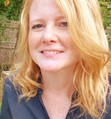Michelle Hauck's Blog, page 142
March 6, 2013
Two Contests
Two exciting pitch fests are starting next week. On Monday, March 11th is the 'Luck 'o the Irish' pitch fest from WriteOnCon. Monday to Wednesday, YA and MG authors can submit their 200 word query letter for review. Twelve agents are involved and each will choose 25 pitches on which to comment.
The other contest is Pitch Madness from Brenda Drake. Entries will be taken during windows on March 15th. The genres can be Adult, New Adult, YA, and MG. For this contest you'll need a 35 word logline/pitch and the first 250 words of your completed manuscript.
Sounds like fun. Good luck to everyone.
The other contest is Pitch Madness from Brenda Drake. Entries will be taken during windows on March 15th. The genres can be Adult, New Adult, YA, and MG. For this contest you'll need a 35 word logline/pitch and the first 250 words of your completed manuscript.
Sounds like fun. Good luck to everyone.
Published on March 06, 2013 13:04
March 1, 2013
Dr. Seuss' Birthday Tribute
In honor of Dr. Seuss' birthday a little tribute I wrote last year. It's a little of this and a little of that, but it might bring a laugh for my writerly gaffs.
At the far end of the tablewhere the toast crumbs lack butterand the grimy dishes gather in piles of clutterand no speech is heard except hollow mutterswas the quarter of the Solitary Writer.
And deep behind the toast crumbs, you may see,if you dare believe, instead of flee,where the Writer once wrotewhat dreams she dared floatbefore someone stole the hope away.
Who was the Writer?And why did she work?And why was she solitary in midnight lurksat the end of the table where the toast crumbs lack butter?The mouse still sets in the murk.Ask it. It knows.
The mouse won’t speak.Don’t left click its button.It rests on the pad, no gluttonfor devious cluckin’.Its batteries glow on low,don’t you know,except for certain dull Tuesdaysin the middle of winterwhen the moon casts its raystoward the laptop’s dark screen.Then the mouse might revealthe fate of the Solitary Writerbefore hope faded away.
It all started way back …Such a long time ago …Way back in the days when the agents were keenand editors did gleanthe words to forward careers most unlean.When six figure advances appeared by the dozenand publishers said welcome dear cousin.
That was when the glorious words first pouredonto paper and laptop, from opening lines to finishing chapters.The bright sparkling words, volumes unmoored,producing not tears but laughter.
And among the words, the nouns did playbefore the hope did die away.The verbs hopped and rumpled, all active by far.With no tellerous was-ing to lower the bar.
To agents the query letters were let fly most trustful.Until day by day, month by month came the sickening smack by the gutfulof scabulous ‘no’s’, so disgustful.
The Writer said nothing. Just hung down her head.No more words. No more nouns. No more verbs to be tried.She silently faded away, the hope had lied.Hearts of pride can only bleed. On the screen, the curser blinked one thing …“Read”
Until someone like you reads a whole awful lot,it won’t be bought.So read for the Writer. Treat her words with care.Give them much praise. Put forth comments that dare. Let no book lack.Then the Writer and all of her friends may come back.
At the far end of the tablewhere the toast crumbs lack butterand the grimy dishes gather in piles of clutterand no speech is heard except hollow mutterswas the quarter of the Solitary Writer.
And deep behind the toast crumbs, you may see,if you dare believe, instead of flee,where the Writer once wrotewhat dreams she dared floatbefore someone stole the hope away.
Who was the Writer?And why did she work?And why was she solitary in midnight lurksat the end of the table where the toast crumbs lack butter?The mouse still sets in the murk.Ask it. It knows.
The mouse won’t speak.Don’t left click its button.It rests on the pad, no gluttonfor devious cluckin’.Its batteries glow on low,don’t you know,except for certain dull Tuesdaysin the middle of winterwhen the moon casts its raystoward the laptop’s dark screen.Then the mouse might revealthe fate of the Solitary Writerbefore hope faded away.
It all started way back …Such a long time ago …Way back in the days when the agents were keenand editors did gleanthe words to forward careers most unlean.When six figure advances appeared by the dozenand publishers said welcome dear cousin.
That was when the glorious words first pouredonto paper and laptop, from opening lines to finishing chapters.The bright sparkling words, volumes unmoored,producing not tears but laughter.
And among the words, the nouns did playbefore the hope did die away.The verbs hopped and rumpled, all active by far.With no tellerous was-ing to lower the bar.
To agents the query letters were let fly most trustful.Until day by day, month by month came the sickening smack by the gutfulof scabulous ‘no’s’, so disgustful.
The Writer said nothing. Just hung down her head.No more words. No more nouns. No more verbs to be tried.She silently faded away, the hope had lied.Hearts of pride can only bleed. On the screen, the curser blinked one thing …“Read”
Until someone like you reads a whole awful lot,it won’t be bought.So read for the Writer. Treat her words with care.Give them much praise. Put forth comments that dare. Let no book lack.Then the Writer and all of her friends may come back.
Published on March 01, 2013 14:33
February 28, 2013
Happy Release Week to Elizabeth Rose!
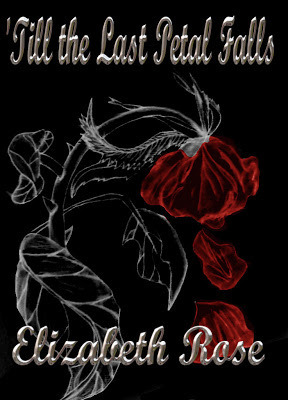
Jolee Bellissa is a 21 year old English major graduate living with her soon-to-be penniless inventor father, Moe, in Highlands Ranch, Colorado. All that's waiting for her in this 'bubble' of a town is a relentless suitor, Gage Aristade (son of a rich accounting CEO and notable playboy), and a part-time job at the local Tattered Cover. When she sees a job listing for a literature and poetry tutor for a shut-in adult student in Aspen, room and board paid with a $1000 a month stipend, she figures she has nothing left to really lose.
Adam Emile is a 33 year old eccentric artist, whose paintings' beauty is only matched by their disturbing choice of focus. Scarred by a horrific childhood and holed up in the mountains to keep from embarrassing his wealthy and famous father, he is beginning to lose all sense of reality. As a last resort, his personal nurse Chip has put out an ad on Craigslist, under the guise of tutoring, for a new friend for his patient. Will the beautiful young woman who answers the ad change Adam and break the curse of his mental depravity? Or will the secrets he harbors drag them both into madness?
Excerpt:
Her father had once told her that she should never go to bed with something heavy on her mind, and to never let things go unsaid longer than was absolutely necessary. There was plenty of night left. It wasn’t like she was going to wake Chip up at midnight and she doubted he went to sleep this early. It would only take a moment. She would air things out and then invite him to go more in depth with her in the morning. Adam wouldn’t ever suspect that she was there.
She didn’t know why that made her feel calm. Why should she fear Adam finding her? It wasn’t like she would be snooping around. She was going to talk to Chip and there were no rules against that. With resolve she set off for the west wing by way of the long hallway at the top of the grand staircase. For some reason she expected a large change when she crossed the threshold to the opposite side of the house, some kind of mysterious mist or gloom. To her mild disappointment the men’s hallway was just the same as the women’s—broad wood paneling that was largely empty of decoration with the exception of a few potted ferns and generic display cases scattered along the edge of the walkway. There were four doors at the end of the hallway. One was at the very end, two were close together on the left and the last stood alone on the right. Since Chip and Adam were the only ones who lived at this end of the house, Jolee guessed that the two doors that were close together led to the men’s private bathrooms. Adam, as head of the household, would have taken the master bedroom, which would logically be behind the door straight ahead at the end of the hall. That left only the single door to the right. She went up to it and rapped lightly.
"Chip?” she called softly. There was no answer.
It couldn’t hurt to try the handle. She found that it was unlocked, but paused before opening it. What if he wasn’t in? Would it spook him if she was waiting for him here? It would be better for her to startle him than Adam. What if she was found loitering around in their hall? Though he had become gentler to her, there was no promise that Adam wasn’t still just as votile and territorial as ever. Perhaps Chip was inside changing or laying down and just hadn’t heard her? With a deep breath she pushed the door open and peeked inside. The lights were out, making it hard to see, but she could tell that the room was much bigger than her own and she couldn’t see a bed. She groped along the wall searching for the light switch and turned it on.
Blinking furiously at the onset of the sudden light, Jolee was inclined to attribute what she saw to the temporary blurriness of her vision. She was surrounded by a flurry of red, dazzling and vibrant in every shade of the spectrum known to the human eye. Paintings covered the room in almost every nook and cranny. They hung from the walls, they leaned against one another; they were splayed across the floor so that there was barely room enough to move around. The only untouched part of the room was a little rough circle in the center just big enough for maybe two people standing close together. Rose petals danced across the canvases like a storm of red flakes. She was drowning in them and drawn even further into them. The petals were painted in various stages of wilting and decay, like a hospital for flowers. Those few that were in bloom were depicted as being torn apart with jagged pieces and demolished stems lying in thick puddles of oil that were painted with such excruciating detail that she feared to touch the sheets for fear of soiling her fingers. She half expected the petals to fall if she so much as stirred them but she couldn’t help getting closer to them. She moved towards them slowly, quietly, as if she could have awakened them. She squatted down to get a closer look and nearly hurled....
Bio:
Elizabeth Rose is a twenty-something college student in Denver, Colorado, double majoring in Religious Studies and English. Though "'Till the Last Petal Falls" is her first full-length novel, she has been published in poetry since her junior year of high school. To date, she had appeared under her real name in over twelve journals, both in print and online.
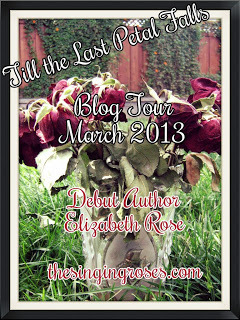 The Links:
The Links:Website: thesingingroses.com
Blog: thesingingroses.wordpress.com
Facebook: facebook.com/thesingingroses
Tumblr: singingroses.tumblr.com
Twitter: @thesingingroses
Contact: author.elizabethrose@gmail.com
Check out her blog for the full blog tour.
Published on February 28, 2013 13:19
February 26, 2013
Getting the Call: Elizabeth Rose
I'm delighted to welcome a fellow small press fan to share her inspirational story. And I believe this might be my first poet. Once again the universal message is to take the risk and stick your neck out there because you just never know where it can lead. Thanks to Elizabeth for sharing her story, and look for more from her later this week!

I’ve always loved reading. I’ve loved it more than anything else that was ever offered to me. I remember in third grade when my father brought me home the Hobbit for the first time, and I taught myself the harder words just to figure out what the gorgeous embossed pictures meant. I was constantly engrossed in who I saw as the literary greats- Tolkien, Lewis, Hawthorne and Poe. The only contemporary things I would read were high satire novels from Terry Pratchett, the grim parodies of Gregory Macguire and occasionally some Rowling. I suppose my first inspiration to write came from being bored with what everyone kept telling me to read. I didn’t want to have anything to do with the middle grade books that they pushed on me in class. I wanted bigger lands, less sappy stories, and healthier relationships. I wrote a couple of things at the time, most of them fantasy novels that were all action scenes and not much else, but quickly abandoned each project. I’d have all these ideas- but no real passion for them. I was writing out of spite, and not a heart-feeling.
So I stopped writing fiction for a while, apart from my occasional short story or two. I focused, instead, on poetry. This form of writing was something that I didn’t much have to work at. It had always come to me, like breathing. It was something that I had to do, not something that I wanted to do. I wrote so much poetry that I decided to try my hand at publishing it, and I’ve been relatively successful at it. To date, I’ve been included in over twenty journals both in print and online with more than fifty poems; my first collection was published traditionally under my birth name in November of 2012.
Somewhere in the mix of all of this, in my sophomore year of college, I took back up fiction writing. Thought it might be fun to finish a story for once. The problem was, I couldn’t even think of anything to write. I tried going back to my old projects and found that I had all but lost all of my fire for them. I had a hard time thinking of anything new. Then one day, on Tumblr, I stumbled upon a feminist rant against the Disney versions of the princess stories. The Disney-fan in my riled, of course, and I had actually begun this process by writing a long and angry response to what this original poster had said. But then I started really thinking about the stories that little girls in the US are raised with and for the first time I really weighed all of the pros and cons. It made me wonder what these kinds of stories would look like if they were written again for those girls who had grown up believing in all of the good messages from those stories, while unconsciously following all of the bad ones. I got to brainstorming, and in the end mapped out a seven-book series, beginning with ‘Till the Last Petal Falls, and got to work.
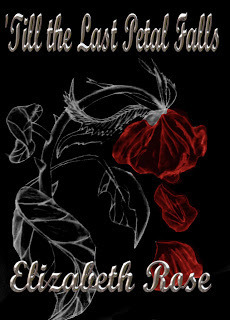 I got really in to the writing of the story. I wrote every second that I could- before bed, after waking up, in the middle of class and during lunch. I would get through about a chapter a week, on average, for a total of thirty-some chapters. I then typed the manuscript up (I always handwrite my works, so that the typing process becomes a sort of edit), and sent it to a couple of family members and friends. It got good feedback, most of which I took into account when I went into edits, and so I thought ‘why not send it around and see what kind of interest it generates?’ I decided to send the manuscript to both agents and small presses alike. Within a week of sending out my query, I was getting requests for the full. A lot of people got back to me with a ‘we like this, but…’. I guess that’s why I didn’t ever get too discouraged when I would get the flat out rejection notices. I was used to it, in the first place, due to my experience in being published with my poetry, and there was enough half-interest to keep my hopes up for long enough.
I got really in to the writing of the story. I wrote every second that I could- before bed, after waking up, in the middle of class and during lunch. I would get through about a chapter a week, on average, for a total of thirty-some chapters. I then typed the manuscript up (I always handwrite my works, so that the typing process becomes a sort of edit), and sent it to a couple of family members and friends. It got good feedback, most of which I took into account when I went into edits, and so I thought ‘why not send it around and see what kind of interest it generates?’ I decided to send the manuscript to both agents and small presses alike. Within a week of sending out my query, I was getting requests for the full. A lot of people got back to me with a ‘we like this, but…’. I guess that’s why I didn’t ever get too discouraged when I would get the flat out rejection notices. I was used to it, in the first place, due to my experience in being published with my poetry, and there was enough half-interest to keep my hopes up for long enough.
I eventually got picked up by Mockingbird Lane Press, a new small mother-daughter run press in Arizona. They got the query, requested the full, and then I didn’t hear from them for a while. I had actually gotten two or three more requests for the full, and I was e-mailing Regina, the head of the Press, to let her know where I was standing with everything. She e-mailed me back, saying to check my mail- that she had sent back some proposed edits, as well as an offer for a contract with Mockingbird Lane. Now that we’ve published ‘Till the Last Petal Falls, I’m hard at work with the second installment, To Dwell in Dreams, which I have written half-way through. I do still hope to get picked up by an agent someday, to be able to lessen my own work-load and get a bigger reach audience wise, but my current experience with a small press hasn’t been unpleasant, and it was still much cheaper than self-publishing.
I suppose the most important thing that people can learn from my experience is that, in publishing, spontaneity is a skill you can use. No agent or publishing house is going to look at your work unless you write it and send it to them. If you’ve got an idea, then go with it! The worst thing anyone can tell you is ‘no, thank you.’ Also, traditional publishing isn’t dead- it’s just moving on to independent publishers and presses. Take a chance on some of these newer companies- you’ll be surprised with how well you and your manuscript are treated. Take the risk! It’s worth it. Website: thesingingroses.com
Blog: thesingingroses.wordpress.com
Facebook: facebook.com/thesingingroses
Tumblr: singingroses.tumblr.com
Twitter: @thesingingroses
Contact: author.elizabethrose@gmail.com

I’ve always loved reading. I’ve loved it more than anything else that was ever offered to me. I remember in third grade when my father brought me home the Hobbit for the first time, and I taught myself the harder words just to figure out what the gorgeous embossed pictures meant. I was constantly engrossed in who I saw as the literary greats- Tolkien, Lewis, Hawthorne and Poe. The only contemporary things I would read were high satire novels from Terry Pratchett, the grim parodies of Gregory Macguire and occasionally some Rowling. I suppose my first inspiration to write came from being bored with what everyone kept telling me to read. I didn’t want to have anything to do with the middle grade books that they pushed on me in class. I wanted bigger lands, less sappy stories, and healthier relationships. I wrote a couple of things at the time, most of them fantasy novels that were all action scenes and not much else, but quickly abandoned each project. I’d have all these ideas- but no real passion for them. I was writing out of spite, and not a heart-feeling.
So I stopped writing fiction for a while, apart from my occasional short story or two. I focused, instead, on poetry. This form of writing was something that I didn’t much have to work at. It had always come to me, like breathing. It was something that I had to do, not something that I wanted to do. I wrote so much poetry that I decided to try my hand at publishing it, and I’ve been relatively successful at it. To date, I’ve been included in over twenty journals both in print and online with more than fifty poems; my first collection was published traditionally under my birth name in November of 2012.
Somewhere in the mix of all of this, in my sophomore year of college, I took back up fiction writing. Thought it might be fun to finish a story for once. The problem was, I couldn’t even think of anything to write. I tried going back to my old projects and found that I had all but lost all of my fire for them. I had a hard time thinking of anything new. Then one day, on Tumblr, I stumbled upon a feminist rant against the Disney versions of the princess stories. The Disney-fan in my riled, of course, and I had actually begun this process by writing a long and angry response to what this original poster had said. But then I started really thinking about the stories that little girls in the US are raised with and for the first time I really weighed all of the pros and cons. It made me wonder what these kinds of stories would look like if they were written again for those girls who had grown up believing in all of the good messages from those stories, while unconsciously following all of the bad ones. I got to brainstorming, and in the end mapped out a seven-book series, beginning with ‘Till the Last Petal Falls, and got to work.
 I got really in to the writing of the story. I wrote every second that I could- before bed, after waking up, in the middle of class and during lunch. I would get through about a chapter a week, on average, for a total of thirty-some chapters. I then typed the manuscript up (I always handwrite my works, so that the typing process becomes a sort of edit), and sent it to a couple of family members and friends. It got good feedback, most of which I took into account when I went into edits, and so I thought ‘why not send it around and see what kind of interest it generates?’ I decided to send the manuscript to both agents and small presses alike. Within a week of sending out my query, I was getting requests for the full. A lot of people got back to me with a ‘we like this, but…’. I guess that’s why I didn’t ever get too discouraged when I would get the flat out rejection notices. I was used to it, in the first place, due to my experience in being published with my poetry, and there was enough half-interest to keep my hopes up for long enough.
I got really in to the writing of the story. I wrote every second that I could- before bed, after waking up, in the middle of class and during lunch. I would get through about a chapter a week, on average, for a total of thirty-some chapters. I then typed the manuscript up (I always handwrite my works, so that the typing process becomes a sort of edit), and sent it to a couple of family members and friends. It got good feedback, most of which I took into account when I went into edits, and so I thought ‘why not send it around and see what kind of interest it generates?’ I decided to send the manuscript to both agents and small presses alike. Within a week of sending out my query, I was getting requests for the full. A lot of people got back to me with a ‘we like this, but…’. I guess that’s why I didn’t ever get too discouraged when I would get the flat out rejection notices. I was used to it, in the first place, due to my experience in being published with my poetry, and there was enough half-interest to keep my hopes up for long enough. I eventually got picked up by Mockingbird Lane Press, a new small mother-daughter run press in Arizona. They got the query, requested the full, and then I didn’t hear from them for a while. I had actually gotten two or three more requests for the full, and I was e-mailing Regina, the head of the Press, to let her know where I was standing with everything. She e-mailed me back, saying to check my mail- that she had sent back some proposed edits, as well as an offer for a contract with Mockingbird Lane. Now that we’ve published ‘Till the Last Petal Falls, I’m hard at work with the second installment, To Dwell in Dreams, which I have written half-way through. I do still hope to get picked up by an agent someday, to be able to lessen my own work-load and get a bigger reach audience wise, but my current experience with a small press hasn’t been unpleasant, and it was still much cheaper than self-publishing.
I suppose the most important thing that people can learn from my experience is that, in publishing, spontaneity is a skill you can use. No agent or publishing house is going to look at your work unless you write it and send it to them. If you’ve got an idea, then go with it! The worst thing anyone can tell you is ‘no, thank you.’ Also, traditional publishing isn’t dead- it’s just moving on to independent publishers and presses. Take a chance on some of these newer companies- you’ll be surprised with how well you and your manuscript are treated. Take the risk! It’s worth it. Website: thesingingroses.com
Blog: thesingingroses.wordpress.com
Facebook: facebook.com/thesingingroses
Tumblr: singingroses.tumblr.com
Twitter: @thesingingroses
Contact: author.elizabethrose@gmail.com
Published on February 26, 2013 19:16
February 24, 2013
Descriptive Inspiration
 The grassy bailey in front of Leeds Castle in England
The grassy bailey in front of Leeds Castle in EnglandI've popped out of editing for a quick post on inspiration for those descriptive passages. In Kindar's Cure I have a couple of chapters set at a castle. Sure I've seen castles on television and in movies. There have been numerous descriptions in books I've read. (What is epic fantasy without a castle?) But seeing pictures on the big screen and reading doesn't give you the true feel of a place. It doesn't let you grasp the spacial placement and true size. For instance, how long does it take to cross the bailey which is the grassy space between the outer walls and the actual castle? You can't smell the smells from a book or touch the coldness of the stone. You can't know whether an actual castle is damp smelling or actual dry and sterile. I don't imagine damp castles survive for long centuries as well as dry ones do. And most importantly, you can't get a feel for the emotion such a grand building creates.
 Side view of Leeds CastleUnless you've been to one.
Side view of Leeds CastleUnless you've been to one.I had the very good fortune to be taken on a vacation to England with my father. I got to see the inside of a number of castle. By no means did this make me an expert, but it did let me grasp the mood of the place to later try and rely that into words. I'm not saying you can't write about castles or swamps without seeing one. I'm just saying it helps.
 Round tower at Windsor Castle taken from the dry moat
Round tower at Windsor Castle taken from the dry moatI used Leeds Castle in Kent as the model for my castle, mostly because I wanted something surrounded by water. It's also set in the countryside and is very green and natural, but also has a very open approach which fit my needs. Leeds is called the loveliest castle in England and this is by a country of people devoted to using the word lovely.
Here is a little piece of the castle description cut from Kindar's Cure:
The castle at Bellmore stood alone in an open meadow. Kindar fidgeted with her reins as she studied the approach. Built at the edge of a reed-edged, natural lake, calm waters surrounded Bellmore on three sides. The fourth side contained the only entrance beyond the postern gate at the back that had to be reached by boat..
 Outer bridge and wall into Leeds Castle ...A grand courtyard bailey surrounded by gray stone walls and portcullis barred the approach to the keep itself which consisted of a single tower.In this open area, watchers would have spotted her immediately. As they rode into the arch before the portcullis, Kindar glanced up. Murder holes in the stone arch revealed soldiers dressed in scarlet and gold inspecting their every move. Drawn bows leveled arrows at their chests. Her hand drifted to her sword and tightened on the grip.
Outer bridge and wall into Leeds Castle ...A grand courtyard bailey surrounded by gray stone walls and portcullis barred the approach to the keep itself which consisted of a single tower.In this open area, watchers would have spotted her immediately. As they rode into the arch before the portcullis, Kindar glanced up. Murder holes in the stone arch revealed soldiers dressed in scarlet and gold inspecting their every move. Drawn bows leveled arrows at their chests. Her hand drifted to her sword and tightened on the grip. Chains rattled as the portcullis shuddered and rose. She crossed into the green of the grassy bailey, waiting as soldiers spilled from outbuildings in the wall and the keep itself. A tall man with officer rank approached from the keep. They surrounded her small party with weapons ready.
Do you find visiting places or scenes from your books gives you a different prospective on them? What's a place you visited that got used in your story? Or maybe a place you wish you could travel to?
Published on February 24, 2013 07:04
February 21, 2013
Lessons Learned the Hard Way: Terri Bruce
All professions have a learning curve and writing is no exception. Yet in writing more than other professions, you're on your own. It's a solitary job after all, which means important aspects of the task sometimes get missed. These posts will be a chance for writers to mentor other writers through their confessions of lessons they learned. Lessons that might have been as painful as a pencil poke in the eye.
You all know how it is to write. Many of us have suffered through the querying stage. But what happens after... Thank goodness Terri Bruce is here to share a dose of reality. Prepare yourself. This is an eye-opening post.

We’re Going to Have to Work on Your People Skills Edition
The beginning of one’s writing career, the “aspiring author” stage is about honing writing craft, about learning the technical skills that go into building a story—plot, pacing, obscure grammar rules, that sort of thing. There’s also a whole lot of learning about the publishing business—query letters, agents, advances, that sort of thing. The great thing is that there’s a TON of advice out there for people at this stage. You can’t throw a rock in the blogosphere or self-help section of the bookstore without hitting someone giving advice on how to write and get published.
So, then, you get published. Hooray! ::party party party:: And then…nothing.
The world goes sort of quiet about what comes next. It’s kind of the same with baby books—lots of books about pregnancy, not so many on dealing with colicky infants. Turns out there is a reason for this: the people who are going through this stage are too damn tired and too damn strapped for time to write down any advice, and by the time they’ve passed through to the next, they’ve forgotten what it was like because it was all a blur.
You’re not just farbot, you’re magra-farbot!
This might be why so many debut/early career authors act like paranoid delusionals—it’s the fatigue and stress talking. I’ve seen authors have meltdowns over three-star reviews (“OMG! They’ve ruined my perfect 4-star rating on Amazon! My authorial career is O-VER!”). I’ve seen authors (and publicists and agents) have “I’m gonna cut the bitch” style meltdowns over 1 or 2 star reviews that were very fair and balanced, with legitimate criticisms. I’ve seen authors have meltdowns because a blogger would not accept their book for review. I’ve seen authors have meltdowns when a blogger was late posting the author’s guest appearance to his blog. I’ve seen authors create “sock puppet” accounts and post fake reviews of their own books and vote down the good reviews of other authors. I’ve seen authors have public meltdowns (and accuse publishers of theft) because they know, with deadly certainty, they sold two copies of their book during the last quarter but didn’t get any royalties. Damn it, they want their $2!!!
Quite a lot of the time I feel like channeling Chuck Wendig and shouting, “just chill the fuck out!” On the other hand, there might be a good reason authors at this stage of their careers get so stressed out.
Sure, they’re cute now, but in a second they’re gonna get mean and they’re gonna get ugly somehow, and there’s going to be a million more of them
You know that scene in Galaxy Quest where Justin Long’s character, Brandon, comes up to Jason Nesmith (Tim Allen’s character) at the convention and starts pestering him with what he (Brandon) perceives as an inconsistency in the show? It’s a squirm-inducing scene because on the one hand, we realize Brandon is trying so desperately hard to impress his hero, but on the other hand, he’s going about it all wrong and having the opposite effect by being a dick, trying to show that he’s smarter than everyone else. Well…those people exist. I just had my first run-in with one at a convention, and it was not fun. To compound the situation, what my “Brandon” was pointing out was not, in fact, incorrect. However, both he and a fellow author sharing the table with me both cut me off mid-explanation, talking right over me and emphatically declaring I was in the wrong—which, of course, made me really, really angry. Like, Tim Allen going off on Brandon angry, which, of course, is not a thing an author wants to do.
This isn’t the worst of it. I’ve had other authors (even those at the same press as me) enter contests against me (after they knew I had already entered), and then plug their book/entry at the top of their voice to the community we both belong to (such as the publishers’ readers’ list), thereby sucking up all the votes in the shared pool for themselves. In one instance, this was a monthly contest and the author in question entered EVERY SINGLE MONTH, even after she won one month, thereby ensuring none of her fellow publishing house authors could have a shot at the limelight. I’ve had unpublished/aspiring writers snub me after I got my publishing deal (presumably out of jealousy), and I’ve seen respected members of the writing community sneer down their noses at other authors’ routes to publication in a high-school level mentality of “my publisher is cooler than your publisher.” I’ve seen authors harass and stalk bloggers/reviewers and I’ve seen bloggers/reviewers harass and stalk authors—including publishing personal information such as home address and the location of the other party’s children’s schools, and ordering their followers into a crusade to destroy the other party. I’ve seen authors hounded out of the public arena—some have had to shut down their twitter or facebook accounts, or even their blogs, in order to deal with the flood of vitriol. When I recently shared that I had sat next to a well-known author at a convention, ten people shrieked that he had no right to be there, he should be home writing, damn him! How dare he spend even one day away from the computer! I’ve seen authors give up writing altogether because the negativity—from their fans!—got to be too much.
So many days I feel like a caterpillar gazing out across an eight-lane mega-highway I have to cross and thinking to myself, “How am I ever going to survive this?”
So, what’s the lesson learned here? Being published is terrifying.
You think putting your work out there for public consumption is the scary part? Excuse me while I laugh—long and loud and with just a touch of hysteria. The reviews are only the tip of the iceberg. I don’t mean to frighten you, soft, squishy newbie writer, but if open and honest criticism by a crit partner or beta reader reduces you to tears, you aren’t ready to be published. As much as I loathed querying, and would rather stab out my eyes with a spoon than go through that process again (a vain wish, I know), it does serve a useful purpose: it builds resistance. It builds strength and endurance and fortitude in the face of criticism, self-doubt, and negativity. It teaches you to revel in and relish the small victories and to take the long view of things. Things that are large setbacks in the short-term are revealed to be mere bumps in the road in the long-term.
So far there hasn’t been a lot of “hard way” for me around this lesson because I was accidentally smart. In the five months between the time I signed my contract and my book hit the shelves, I lurked about the internet, getting a feel for things. I read book blogs and learned what kinds of things book bloggers care about—what they were reading, what they liked and didn’t like in books, what they liked and didn’t like in author behavior, how they liked to be approached with review and tour requests. I dipped my toe into Twitter and figured out how to have conversations with strangers—and how to turn the other cheek or keep my mouth shut when provoked. I watched authors implode on the internet and I watched other authors successfully navigate situations that could have gone south. I learned just how deep a footprint we leave on the internet, even when we think we don’t. I’ve seen bloggers recreate tweets and facebook posts from cached images and screen captures—even after the posts were deleted—and I’ve seen bloggers reveal fraud by tracing I.P. addresses and conducting sophisticated analysis of text to link blog posts, reviews, and even blog comments to one individual.
Through all this, I’ve learned patience and tolerance. I’ve also learned that the long-tail of the internet values honesty and genuineness above all else—don’t interfere with people’s right to their own opinion or free speech. Don’t try to cheat or fool people. If you make a mistake, own up to it immediately. Apologize. Be humble—after all, you’re the one that screwed up. Be a real person—it’s okay to just chat with people, without trying to get something from them (a review, a spot on their blog, a sale). Be grateful—say thank you. Give more than you take. Don’t use people. Don’t get big-headed. Share the limelight—let other people have a turn. Don’t sneer at others or look down at them. Don’t be defensive—it’s always a deflection of what you’re actually feeling and it just pisses people off. If you’re embarrassed, say you’re embarrassed; if you’re disappointed, say you’re disappointed; if you feel like an idiot, say you feel like an idiot. Learn to let shit go. Relax. Keep in mind that disliking your work is not the same as disliking you personally. Learn to value the people who understand this. Ignore the people who don’t. And remember: you got into this business because you have something to say, something to share. It doesn’t matter if people recognize the importance of what you have to say—their recognition (or not) doesn’t change its value.
About the Author
Terri Bruce has been making up adventure stories for as long as she can remember and won her first writing award when she was twelve. Like Anne Shirley, she prefers to make people cry rather than laugh, but is happy if she can do either. She produces fantasy and adventure stories from a haunted house in New England where she lives with her husband and three cats. Her second novel, Thereafter (Afterlife #2), will be released June 1, 2013.Contact DetailsEmail: tbruce@terribruce.netWebsite/Blog: www.terribruce.netGoodreads: www.goodreads.com/TerriBruceFacebook: http://www.facebook.com/authorterribr... @_TerriBruce
You all know how it is to write. Many of us have suffered through the querying stage. But what happens after... Thank goodness Terri Bruce is here to share a dose of reality. Prepare yourself. This is an eye-opening post.

We’re Going to Have to Work on Your People Skills Edition
The beginning of one’s writing career, the “aspiring author” stage is about honing writing craft, about learning the technical skills that go into building a story—plot, pacing, obscure grammar rules, that sort of thing. There’s also a whole lot of learning about the publishing business—query letters, agents, advances, that sort of thing. The great thing is that there’s a TON of advice out there for people at this stage. You can’t throw a rock in the blogosphere or self-help section of the bookstore without hitting someone giving advice on how to write and get published.
So, then, you get published. Hooray! ::party party party:: And then…nothing.
The world goes sort of quiet about what comes next. It’s kind of the same with baby books—lots of books about pregnancy, not so many on dealing with colicky infants. Turns out there is a reason for this: the people who are going through this stage are too damn tired and too damn strapped for time to write down any advice, and by the time they’ve passed through to the next, they’ve forgotten what it was like because it was all a blur.
You’re not just farbot, you’re magra-farbot!
This might be why so many debut/early career authors act like paranoid delusionals—it’s the fatigue and stress talking. I’ve seen authors have meltdowns over three-star reviews (“OMG! They’ve ruined my perfect 4-star rating on Amazon! My authorial career is O-VER!”). I’ve seen authors (and publicists and agents) have “I’m gonna cut the bitch” style meltdowns over 1 or 2 star reviews that were very fair and balanced, with legitimate criticisms. I’ve seen authors have meltdowns because a blogger would not accept their book for review. I’ve seen authors have meltdowns when a blogger was late posting the author’s guest appearance to his blog. I’ve seen authors create “sock puppet” accounts and post fake reviews of their own books and vote down the good reviews of other authors. I’ve seen authors have public meltdowns (and accuse publishers of theft) because they know, with deadly certainty, they sold two copies of their book during the last quarter but didn’t get any royalties. Damn it, they want their $2!!!
Quite a lot of the time I feel like channeling Chuck Wendig and shouting, “just chill the fuck out!” On the other hand, there might be a good reason authors at this stage of their careers get so stressed out.
Sure, they’re cute now, but in a second they’re gonna get mean and they’re gonna get ugly somehow, and there’s going to be a million more of them
You know that scene in Galaxy Quest where Justin Long’s character, Brandon, comes up to Jason Nesmith (Tim Allen’s character) at the convention and starts pestering him with what he (Brandon) perceives as an inconsistency in the show? It’s a squirm-inducing scene because on the one hand, we realize Brandon is trying so desperately hard to impress his hero, but on the other hand, he’s going about it all wrong and having the opposite effect by being a dick, trying to show that he’s smarter than everyone else. Well…those people exist. I just had my first run-in with one at a convention, and it was not fun. To compound the situation, what my “Brandon” was pointing out was not, in fact, incorrect. However, both he and a fellow author sharing the table with me both cut me off mid-explanation, talking right over me and emphatically declaring I was in the wrong—which, of course, made me really, really angry. Like, Tim Allen going off on Brandon angry, which, of course, is not a thing an author wants to do.
This isn’t the worst of it. I’ve had other authors (even those at the same press as me) enter contests against me (after they knew I had already entered), and then plug their book/entry at the top of their voice to the community we both belong to (such as the publishers’ readers’ list), thereby sucking up all the votes in the shared pool for themselves. In one instance, this was a monthly contest and the author in question entered EVERY SINGLE MONTH, even after she won one month, thereby ensuring none of her fellow publishing house authors could have a shot at the limelight. I’ve had unpublished/aspiring writers snub me after I got my publishing deal (presumably out of jealousy), and I’ve seen respected members of the writing community sneer down their noses at other authors’ routes to publication in a high-school level mentality of “my publisher is cooler than your publisher.” I’ve seen authors harass and stalk bloggers/reviewers and I’ve seen bloggers/reviewers harass and stalk authors—including publishing personal information such as home address and the location of the other party’s children’s schools, and ordering their followers into a crusade to destroy the other party. I’ve seen authors hounded out of the public arena—some have had to shut down their twitter or facebook accounts, or even their blogs, in order to deal with the flood of vitriol. When I recently shared that I had sat next to a well-known author at a convention, ten people shrieked that he had no right to be there, he should be home writing, damn him! How dare he spend even one day away from the computer! I’ve seen authors give up writing altogether because the negativity—from their fans!—got to be too much.
So many days I feel like a caterpillar gazing out across an eight-lane mega-highway I have to cross and thinking to myself, “How am I ever going to survive this?”
So, what’s the lesson learned here? Being published is terrifying.
You think putting your work out there for public consumption is the scary part? Excuse me while I laugh—long and loud and with just a touch of hysteria. The reviews are only the tip of the iceberg. I don’t mean to frighten you, soft, squishy newbie writer, but if open and honest criticism by a crit partner or beta reader reduces you to tears, you aren’t ready to be published. As much as I loathed querying, and would rather stab out my eyes with a spoon than go through that process again (a vain wish, I know), it does serve a useful purpose: it builds resistance. It builds strength and endurance and fortitude in the face of criticism, self-doubt, and negativity. It teaches you to revel in and relish the small victories and to take the long view of things. Things that are large setbacks in the short-term are revealed to be mere bumps in the road in the long-term.
So far there hasn’t been a lot of “hard way” for me around this lesson because I was accidentally smart. In the five months between the time I signed my contract and my book hit the shelves, I lurked about the internet, getting a feel for things. I read book blogs and learned what kinds of things book bloggers care about—what they were reading, what they liked and didn’t like in books, what they liked and didn’t like in author behavior, how they liked to be approached with review and tour requests. I dipped my toe into Twitter and figured out how to have conversations with strangers—and how to turn the other cheek or keep my mouth shut when provoked. I watched authors implode on the internet and I watched other authors successfully navigate situations that could have gone south. I learned just how deep a footprint we leave on the internet, even when we think we don’t. I’ve seen bloggers recreate tweets and facebook posts from cached images and screen captures—even after the posts were deleted—and I’ve seen bloggers reveal fraud by tracing I.P. addresses and conducting sophisticated analysis of text to link blog posts, reviews, and even blog comments to one individual.
Through all this, I’ve learned patience and tolerance. I’ve also learned that the long-tail of the internet values honesty and genuineness above all else—don’t interfere with people’s right to their own opinion or free speech. Don’t try to cheat or fool people. If you make a mistake, own up to it immediately. Apologize. Be humble—after all, you’re the one that screwed up. Be a real person—it’s okay to just chat with people, without trying to get something from them (a review, a spot on their blog, a sale). Be grateful—say thank you. Give more than you take. Don’t use people. Don’t get big-headed. Share the limelight—let other people have a turn. Don’t sneer at others or look down at them. Don’t be defensive—it’s always a deflection of what you’re actually feeling and it just pisses people off. If you’re embarrassed, say you’re embarrassed; if you’re disappointed, say you’re disappointed; if you feel like an idiot, say you feel like an idiot. Learn to let shit go. Relax. Keep in mind that disliking your work is not the same as disliking you personally. Learn to value the people who understand this. Ignore the people who don’t. And remember: you got into this business because you have something to say, something to share. It doesn’t matter if people recognize the importance of what you have to say—their recognition (or not) doesn’t change its value.
About the Author
Terri Bruce has been making up adventure stories for as long as she can remember and won her first writing award when she was twelve. Like Anne Shirley, she prefers to make people cry rather than laugh, but is happy if she can do either. She produces fantasy and adventure stories from a haunted house in New England where she lives with her husband and three cats. Her second novel, Thereafter (Afterlife #2), will be released June 1, 2013.Contact DetailsEmail: tbruce@terribruce.netWebsite/Blog: www.terribruce.netGoodreads: www.goodreads.com/TerriBruceFacebook: http://www.facebook.com/authorterribr... @_TerriBruce
Published on February 21, 2013 13:26
February 17, 2013
Editing Confessions
Ever since Divertir decided to publish Kindar's Cure, I've imagined what it would be like to work with a professional editor. Stressed over it would be a better description. What kind of changes would an editor demand? I worried about renaming characters, cutting scenes or whole chapters, a word count goal to meet, and gaping plot holes to close. Large scale sacrifices. So far none of that has happened.
Instead the work has been focused on smaller things, such as word choice and single versus double quotes. Big sigh of relief. My lovely and dedicated editor did set me a task: paragraph merging. Seems my idea of when to start a new paragraph and the rules of paragraphs don't exactly coincide.
Funny, how all the things you imagine about something come nowhere near the actual. I never gave a thought to paragraphs when I dreamed of working with an editor. Paragraphs flew well under my radar. It's not a subject that my critique partners and I ever discuss or point out to each other. Paragraphs are just there, much like periods and spaces. Part of the picture, but not a critical part. Oops. Time to rethink that.
And as I was looking for places where paragraphs should be merged, I was also looking for other editing goofs. And boy did I find them. A couple of verbs with the wrong tense. Two spots with character names spelled wrong that my eye must have missed at least a dozen times. A word I changed using 'Find and Replace', but didn't search for that word when it had a punctuation mark after it so all those got skipped. Yikes!
Then there are the words that always trip me up. The certain words that my critique partners find and point out to me time and again. Words that I now know to do a search for because they'll be wrong, wrong, wrong. For me, those words are cheek,conscience, wield, steel, and wince. A blush rose in her check. He welded the sword. She winched. The sort of mistakes that would be embarrassing to miss. I'm sure there are many more goofs to find. Fingers crossed my editor can pick out the rest.
So how about you? Got any confessions to make? Are there certain words that trip you every time? Does paragraphing fly under your radar? Confession is good for the soul so please share in the comments. Now I have to steel away. Wink.
Instead the work has been focused on smaller things, such as word choice and single versus double quotes. Big sigh of relief. My lovely and dedicated editor did set me a task: paragraph merging. Seems my idea of when to start a new paragraph and the rules of paragraphs don't exactly coincide.
Funny, how all the things you imagine about something come nowhere near the actual. I never gave a thought to paragraphs when I dreamed of working with an editor. Paragraphs flew well under my radar. It's not a subject that my critique partners and I ever discuss or point out to each other. Paragraphs are just there, much like periods and spaces. Part of the picture, but not a critical part. Oops. Time to rethink that.
And as I was looking for places where paragraphs should be merged, I was also looking for other editing goofs. And boy did I find them. A couple of verbs with the wrong tense. Two spots with character names spelled wrong that my eye must have missed at least a dozen times. A word I changed using 'Find and Replace', but didn't search for that word when it had a punctuation mark after it so all those got skipped. Yikes!
Then there are the words that always trip me up. The certain words that my critique partners find and point out to me time and again. Words that I now know to do a search for because they'll be wrong, wrong, wrong. For me, those words are cheek,conscience, wield, steel, and wince. A blush rose in her check. He welded the sword. She winched. The sort of mistakes that would be embarrassing to miss. I'm sure there are many more goofs to find. Fingers crossed my editor can pick out the rest.
So how about you? Got any confessions to make? Are there certain words that trip you every time? Does paragraphing fly under your radar? Confession is good for the soul so please share in the comments. Now I have to steel away. Wink.
Published on February 17, 2013 07:45
February 15, 2013
Getting the Call: Heidi Vlach
I'm surfacing just long enough from a week of heavy editing on Kindar's Cure to post a dose of inspiration. I met Heidi on Twitter and invited her to share her story. I know many writers whose stories don't fit into a neat and tidy cubbyhole of what is considered marketable--I'm one of them. I really love how Heidi didn't let that news stop her. Thanks for telling us about your journey, Heidi. And your cover art is beautiful.
[image error]
Thanks for having me, Michelle!
I didn't receive a call -- it's more like I unearthed one. I'm just grateful this happened during the ebook revolution, where I have the tools to excavate.
When I'm taking in a book, TV show or video game, I usually find the non-human characters most interesting. The human experience has lots to explore, but that bounty grows even larger when you consider how another sentient being might see things. I want to know what the anthropomorphic cat is thinking, or how the intelligent squid feels about life and love. I don't think you need a human-looking face to be considered a person. If everyone thought that way, humans might even have more empathy for fellow humans.
When I was 18, I decided to develop a novel full of the things I wanted to see. It took six years of work, and my awful first manuscript getting trunked, but I developed the world of Aligare. This place is completely human-free. The peoplekinds are feathered dragons, and insect-like folk, and bright-eyed weasels -- all of whom live peacefully and collaborate to solve their problems. No senseless wars or xenophobia here. This would be a cool place to mentally explore, the really unique story I had never been able to find in the library.
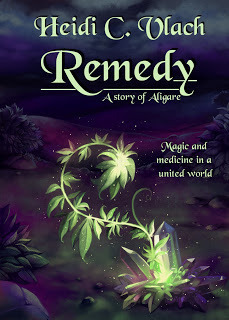 My second full-length manuscript was Remedy, a medical drama. It's the story of deaf miner Peregrine and his hearing assistant Tillian. Peregrine is a proud old dragon who secretly fears that he made the wrong life choices; Tillian is a friendly little weasel who swore to stay by Peregrine's side as long as her own lifespan allows. These two pitch in with the relief efforts for gripthia, a dreaded sickness which can only be survived with labour-intensive nursing care. It's a big step for Peregrine to get by without Tillian, but he's determined to give her some independence. The core of this story is the struggle to do what's right.
My second full-length manuscript was Remedy, a medical drama. It's the story of deaf miner Peregrine and his hearing assistant Tillian. Peregrine is a proud old dragon who secretly fears that he made the wrong life choices; Tillian is a friendly little weasel who swore to stay by Peregrine's side as long as her own lifespan allows. These two pitch in with the relief efforts for gripthia, a dreaded sickness which can only be survived with labour-intensive nursing care. It's a big step for Peregrine to get by without Tillian, but he's determined to give her some independence. The core of this story is the struggle to do what's right.
I was proud of this novel. Still am. Years of finessing had gone into the worldbuilding, and the storyline was unlike anything I had ever seen in mass-market fantasy. But I sent out about 50 query letters and I got all form rejections. Not one nibble. I didn't want to become one of those writers who wastes their whole life waiting on query letters, stuck in a depressing, directionless purgatory. So when I saw a charity fundraiser auction for a meeting with a New York editor, I jumped on it. Quite a road trip, from Ontario to New York, but I was glad for it! Face to face, I explained Remedy's concept to one knowledgeable editor-- and I was flatly told that this thing wouldn't sell. It wasn't a children's "animal book" and it wasn't a fantasy war epic, so it was clearly unmarketable.
I've never believed it possible that "no one" will like a new concept. There are billions of people in this world and they all have different tastes. No matter how odd the subject, there are always a few people willing to try. More importantly, if no one is ever willing to try a new concept, how does the modern fantasy genre exist in the first place? Did <i>Lord of the Rings</i> leap fully formed from Zeus's head and land on bookstore shelves?
On the bus home from New York, I realized I had found a calling. A fragment of potential that needed to be dug up, cleaned and put on display. And instead of hoping some agent would unearth my calling for me, I decided to self-publish. I'd be able to explore my Stories of Aligare on their own merit, without worrying about making them "normal". Over the next few months, I consulted a freelance editor who liked atypical stories. I agonized over how Remedy's cover should look. Finally, on February 2011, I clicked the Publish button for my first completed book.
I wish I could say that Remedy has sold ten zillion copies so far. Heh, it sure hasn't! But building a niche can be a slow process, especially when the story doesn't fit cleanly into popular genre categories. I'm playing a long game, here. A story doesn't have to be an instant bestseller to be an enjoyable story: in our modern world of high-budget blockbusters, it's easy to forget that.
After Remedy came Ravel, a romantic novelette set in Aligare. This spring, I'll be publishing Render, a mystery-ish novel of Aligare. Each story stands alone and has a slightly different flavour. There'll be more stories -- and I just hope to find readers who like seeing through other creatures' eyes like I do.
Find out more about Heidi and the world of Aligare at www.heidicvlach.com. Heidi's books are available through Amazon, Smashwords, Barnes and Noble, and other online retailers.
Links: http://www.heidicvlach.comhttp://www....
[image error]
Thanks for having me, Michelle!
I didn't receive a call -- it's more like I unearthed one. I'm just grateful this happened during the ebook revolution, where I have the tools to excavate.
When I'm taking in a book, TV show or video game, I usually find the non-human characters most interesting. The human experience has lots to explore, but that bounty grows even larger when you consider how another sentient being might see things. I want to know what the anthropomorphic cat is thinking, or how the intelligent squid feels about life and love. I don't think you need a human-looking face to be considered a person. If everyone thought that way, humans might even have more empathy for fellow humans.
When I was 18, I decided to develop a novel full of the things I wanted to see. It took six years of work, and my awful first manuscript getting trunked, but I developed the world of Aligare. This place is completely human-free. The peoplekinds are feathered dragons, and insect-like folk, and bright-eyed weasels -- all of whom live peacefully and collaborate to solve their problems. No senseless wars or xenophobia here. This would be a cool place to mentally explore, the really unique story I had never been able to find in the library.
 My second full-length manuscript was Remedy, a medical drama. It's the story of deaf miner Peregrine and his hearing assistant Tillian. Peregrine is a proud old dragon who secretly fears that he made the wrong life choices; Tillian is a friendly little weasel who swore to stay by Peregrine's side as long as her own lifespan allows. These two pitch in with the relief efforts for gripthia, a dreaded sickness which can only be survived with labour-intensive nursing care. It's a big step for Peregrine to get by without Tillian, but he's determined to give her some independence. The core of this story is the struggle to do what's right.
My second full-length manuscript was Remedy, a medical drama. It's the story of deaf miner Peregrine and his hearing assistant Tillian. Peregrine is a proud old dragon who secretly fears that he made the wrong life choices; Tillian is a friendly little weasel who swore to stay by Peregrine's side as long as her own lifespan allows. These two pitch in with the relief efforts for gripthia, a dreaded sickness which can only be survived with labour-intensive nursing care. It's a big step for Peregrine to get by without Tillian, but he's determined to give her some independence. The core of this story is the struggle to do what's right.I was proud of this novel. Still am. Years of finessing had gone into the worldbuilding, and the storyline was unlike anything I had ever seen in mass-market fantasy. But I sent out about 50 query letters and I got all form rejections. Not one nibble. I didn't want to become one of those writers who wastes their whole life waiting on query letters, stuck in a depressing, directionless purgatory. So when I saw a charity fundraiser auction for a meeting with a New York editor, I jumped on it. Quite a road trip, from Ontario to New York, but I was glad for it! Face to face, I explained Remedy's concept to one knowledgeable editor-- and I was flatly told that this thing wouldn't sell. It wasn't a children's "animal book" and it wasn't a fantasy war epic, so it was clearly unmarketable.
I've never believed it possible that "no one" will like a new concept. There are billions of people in this world and they all have different tastes. No matter how odd the subject, there are always a few people willing to try. More importantly, if no one is ever willing to try a new concept, how does the modern fantasy genre exist in the first place? Did <i>Lord of the Rings</i> leap fully formed from Zeus's head and land on bookstore shelves?
On the bus home from New York, I realized I had found a calling. A fragment of potential that needed to be dug up, cleaned and put on display. And instead of hoping some agent would unearth my calling for me, I decided to self-publish. I'd be able to explore my Stories of Aligare on their own merit, without worrying about making them "normal". Over the next few months, I consulted a freelance editor who liked atypical stories. I agonized over how Remedy's cover should look. Finally, on February 2011, I clicked the Publish button for my first completed book.
I wish I could say that Remedy has sold ten zillion copies so far. Heh, it sure hasn't! But building a niche can be a slow process, especially when the story doesn't fit cleanly into popular genre categories. I'm playing a long game, here. A story doesn't have to be an instant bestseller to be an enjoyable story: in our modern world of high-budget blockbusters, it's easy to forget that.
After Remedy came Ravel, a romantic novelette set in Aligare. This spring, I'll be publishing Render, a mystery-ish novel of Aligare. Each story stands alone and has a slightly different flavour. There'll be more stories -- and I just hope to find readers who like seeing through other creatures' eyes like I do.
Find out more about Heidi and the world of Aligare at www.heidicvlach.com. Heidi's books are available through Amazon, Smashwords, Barnes and Noble, and other online retailers.
Links: http://www.heidicvlach.comhttp://www....
Published on February 15, 2013 13:15
February 11, 2013
Stealing History: Transforming the Tudors
The advice is to write what you know. But how do you do that when you write fantasy? My life experience with magic and sword play is limited—okay, nonexistent. However, there are other angles besides the plot to put this advice into practice, such as the characters. So when I began to imagine the new characters for my epic fantasy, Kindar’s Cure , I searched my mind for any knowledge I could apply. What did I know a lot about that could make my story stronger? The answer was history.
 Stealing: I’ve always had a love of history. I can’t resist picking up new biographies at the library, and the more ancient the subject the better. I’m not talking reads about Snookie or Barack Obama. I prefer Churchill or Hadrian or Catherine the Great. My two areas of special interest have always been Revolutionary America and Tudor England. I’ve read everything I came across on those subjects.
Stealing: I’ve always had a love of history. I can’t resist picking up new biographies at the library, and the more ancient the subject the better. I’m not talking reads about Snookie or Barack Obama. I prefer Churchill or Hadrian or Catherine the Great. My two areas of special interest have always been Revolutionary America and Tudor England. I’ve read everything I came across on those subjects. The revolutionary era didn’t really fit with my story based in a medieval world, but the Tudors were a goldmine. They were a royal family with three children, and Kindar was the middle daughter of a royal family. I needed conflict and dysfunction, and what’s more messed up than Henry VIII, his six wives and three kids, Mary, Elizabeth, and Edward? My Kindar is a strong determined woman, who knows her own mind and wants a throne. One of the strongest queens in history, Elizabeth the First, Henry’s second daughter, managed to survive her father’s deadly displeasure to take the throne. I began to model my royal family on those famous true-life royals.
Transforming: I couldn’t pick up the Tudors and set them down as is into my fantasy world. That would be a little too obvious. I took the facts about them and molded them, twisting and shaping until I had a shadow version of history.
The single biggest change was to make my world, Anost, a matriarchal kingdom. Henry became an empress instead of a king. I also turned, his son, Prince Edward, into the bratty youngest daughter, making my entire royal family female. Obviously, I couldn’t have one wife, let alone six. I left the wives out and created one banished husband. Making the relationships inside my royal family every bit as unhappy as the true life version, my story focused on telling the tale from the prospective of a Tudor heir.
 After all, Henry VIII declared both his daughters bastards and kept them under house arrest, with the headman’s axe continually hanging over their heads. What would life have been like for the disfavored Elizabeth and Mary? Henri divorced or murdered their mothers. Henry VII was also notorious for his rages and unpredictable temper, led on by paranoid fears. What better conflict than to give these same character traits, including the raging hysterics, to my Empress Eugenie, making sure her royal daughters suffered the same uncertainty and threat as their historically versions.
After all, Henry VIII declared both his daughters bastards and kept them under house arrest, with the headman’s axe continually hanging over their heads. What would life have been like for the disfavored Elizabeth and Mary? Henri divorced or murdered their mothers. Henry VII was also notorious for his rages and unpredictable temper, led on by paranoid fears. What better conflict than to give these same character traits, including the raging hysterics, to my Empress Eugenie, making sure her royal daughters suffered the same uncertainty and threat as their historically versions.Desperate for a male heir, the War of the Roses just before his father’s reign gave Henry a horror of an unstable succession. That one great terror drove all his decisions, including throwing off wife after wife along with his entire country’s Catholic religion. And as Henry the VIII had a deep abiding reason for his wife shuffle, my empress needed something to drive her.
What better than a prophecy of doom and gloom? A prophecy that predicted the advent of three royal daughters would proceed a time of dark catastrophe and war for Anost. A dark time that Empress Eugenie was desperate to keep off by whatever means necessary.
Outside the real sixteenth century Tudor family, the conflicts was every bit as bad. Tensions couldn’t help but spill over to their court. Whispers of treason were everywhere. The headsman axe had frequent business among the noblemen and women, creating an aura of suspicion and terror where people were afraid to look crossways at each other lest trouble land on them. The Tudor children couldn’t trust their father, their siblings or the people surrounding them. Mistrust isolated them. I built the same atmosphere around Kindar, forcing her to start the story as a hard, cold character, clinging to her rank and herself, unable to speak her thoughts even to her allies.
 The Tudor atmosphere gave me a great starting conflict, but I needed more. I threw a new twist into the story. Kindar, like Elizabeth the First, had to rely on her own wits to survive, but I created Kindar with another strike against her. Kindar has a disease. Disease in the middle ages was a judgment sent against you by God. God found you flawed, morally or spiritually, and He marked you in a way to show the world your faults. It made Kindar even more shunned by her family and everyone around her.
The Tudor atmosphere gave me a great starting conflict, but I needed more. I threw a new twist into the story. Kindar, like Elizabeth the First, had to rely on her own wits to survive, but I created Kindar with another strike against her. Kindar has a disease. Disease in the middle ages was a judgment sent against you by God. God found you flawed, morally or spiritually, and He marked you in a way to show the world your faults. It made Kindar even more shunned by her family and everyone around her.Then I added a dose of murder, having the eldest daughter in the Mary role killed. Suspicion naturally falls on the next daughter in line. A daughter with a sickness that makes her worthless, but whose desire to rule is well-known. Suddenly, Kindar is under arrest. A pressure that sends her running to find a cure and the rest is history, so to speak.
So in what way have you stolen or transformed history to suit your story needs?
Published on February 11, 2013 12:56
February 9, 2013
Lessons Learned the Hard Way: Carla Rehse
All professions have a learning curve and writing is no exception. Yet in writing more than other professions, you're on your own. It's a solitary job after all, which means important aspects of the task sometimes get missed. These posts will be a chance for writers to mentor other writers through their confessions of lessons they learned. Lessons that might have been as painful as a pencil poke in the eye.
I'm happy to welcome my CP and fellow YA dystopian writer, Carla. You may not know this, but Carla is the fastest reader I've ever had the privileged of exchanging work with. If you need something looked over fast because you got an unexpected request, she's the tops. She's pulled my butt from the fire again and again. Thanks for sharing your wisdom with us, Carla.

“Never give up, never surrender!” from Galaxy Quest is one of my favorite quotes. It’s also a double-edged sword when applied to writing, as I recently realized. Practice, patience, and perseverance are the three “Ps” of writing. I started writing almost four years ago, and with the help of my fabulous critique partners (thanks Michelle!), my skills have improved. I have learned to love commas, or at least not hate them as much as college algebra. After finishing and querying two books, I’ve also learned to be patient. Characters evolve at their own pace in the story. Checking my email 500 times an hour won’t make an agent respond any faster. It’s the last “P” that has proven tricky for me. I knew when I queried my first book that becoming published would take a long time, unless I wanted to try self-publishing. I had read many blogs about the querying journey, and I expected the rejections and the months of waiting while an agent read my book. What I hadn’t prepared for is when do you stop and let a book go? What is the right amount of perseverance? I queried my first book, Fringe Towns, for almost a year before writing my second. But while querying my second book, I couldn’t leave Fringe alone. If I found a new agent, I sent off a query and ignored my second book. I spent 2012, revising and reimagining Fringe. Over Christmas, several friends I hadn’t seen all year asked if I was still writing. I mulled over that for a month, until I realized the truth. Actually, I had stopped writing. It was time to let Fringe Towns go. If your goal in writing is to become published, perseverance is a must. But perseverance should be about pushing forward, not staying stuck in the same place. I’m now writing a book that I started last year before putting it to the side. So, here’s to a new year, new ideas, and lessons learned.
Published on February 09, 2013 06:03

